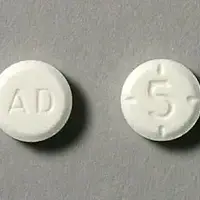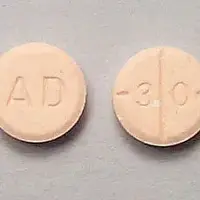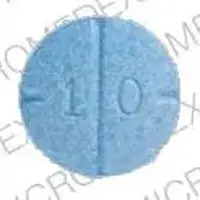Generic name: amphetamine and dextroamphetamine
Drug class: CNS stimulants
Dosage form: tablet
Availability: Prescription only
Pregnancy & Lactation: Risk data available
Brand names: Adderall xr, Mydayis, Amphetamine and dextroamphetamine
What is Adderall?
Adderall is used to treat attention deficit hyperactivity disorder (ADHD) and narcolepsy. Adderall contains a combination of amphetamine and dextroamphetamine. Amphetamine and dextroamphetamine are central nervous system stimulants that affect chemicals in the brain and nerves that contribute to hyperactivity and impulse control.
Adderall may also be used for purposes not listed in this medication guide.
Warnings
Adderall may be habit-forming, and this medicine is a drug of abuse. Tell your doctor if you have had problems with drug or alcohol abuse.
Stimulants have caused stroke, heart attack, and sudden death in people with high blood pressure, heart disease, or a heart defect.
Do not use this medicine if you have used a MAO inhibitor in the past 14 days, such as isocarboxazid, linezolid, phenelzine, rasagiline, selegiline, or tranylcypromine or have received a methylene blue injection.
Adderall may cause new or worsening psychosis (unusual thoughts or behavior), especially if you have a history of depression, mental illness, or bipolar disorder.
You may have blood circulation problems that can cause numbness, pain, or discoloration in your fingers or toes.
Call your doctor right away if you have: signs of heart problems - chest pain, feeling light-headed or short of breath; signs of psychosis - paranoia, aggression, new behavior problems, seeing or hearing things that are not real; signs of circulation problems - unexplained wounds on your fingers or toes.
You may not be able to use Adderall if you have glaucoma, overactive thyroid, severe agitation, moderate to severe high blood pressure, heart disease or coronary artery disease, vascular disease, or a history of drug or alcohol addiction.
How should I take Adderall
Take Adderall exactly as prescribed by your doctor. Follow all directions on your prescription label. Your doctor may occasionally change your dose. Do not take this medicine in larger or smaller amounts or for longer than recommended.
Adderall may be habit-forming. Never share this medicine with another person, especially someone with a history of drug abuse or addiction. Keep the medication in a place where others cannot get to it. Selling or giving away this medicine is against the law.
Read all patient information, medication guides, and instruction sheets provided to you. Ask your doctor or pharmacist if you have any questions.
You may take Adderall with or without food, first thing in the morning.
Do not crush, chew, break, or open an extended-release capsule. Swallow it whole.
To make swallowing easier, you may open the capsule and sprinkle the medicine into a spoonful of applesauce. Swallow right away without chewing. Do not save the mixture for later use.
While using this medicine, your doctor will need to check your progress at regular visits. Tell any doctor who treats you that you are using this medicine.
Adderall can cause unusual results with certain medical tests. Tell any doctor who treats you that you are using this medicine.
Store at room temperature away from moisture, heat, and light.
Keep track of your medicine. Adderall is a drug of abuse and you should be aware if anyone is using your medicine improperly or without a prescription.
Dosing information
Usual Adult Dose of Adderall for Attention Deficit Disorder:
IR:
-Initial Dose: 5 mg orally 1 or 2 times a day
-Maintenance Dose: Daily dose may be raised in 5 mg increments at weekly intervals until optimal response is obtained.
-Maximum Dose: Only in rare cases will it be necessary to exceed 40 mg per day.
XR:
Patients starting treatment for the first time or switching from another medication:
-Initial Dose: 20 mg orally once a day
Comments:
-IR: The first dose should be given upon awakening; 1 to 2 additional doses should be given at intervals of 4 to 6 hours.
-Where possible, drug administration should be interrupted occasionally to determine if continued therapy is required.
Use: As part of a total treatment program for Attention Deficit Hyperactivity Disorder (ADHD).
Usual Adult Dose of Adderall for Narcolepsy:
IR:
-Initial Dose: 10 mg orally per day in divided doses
-Maintenance Dose: Daily dose may be raised in 10 mg increments at weekly intervals until optimal response is obtained.
Comments:
-The first dose should be given on awakening; 1 to 2 additional doses should be given at intervals of 4 to 6 hours.
-The usual dose is 5 to 60 mg per day in divided doses, depending on the individual patient response.
-Dosage should be reduced if bothersome adverse reactions (e.g., insomnia, anorexia) appear.
Use: Narcolepsy treatment
Usual Pediatric Dose of Adderall for Attention Deficit Disorder:
IR:
Age 3 to 5 Years:
-Initial Dose: 2.5 mg orally per day
-Maintenance Dose: Daily dose may be raised in 2.5 mg increments at weekly intervals until optimal response is obtained.
Age 6 to 17 Years:
-Initial Dose: 5 mg orally 1 or 2 times a day
-Maintenance Dose: Daily dose may be raised in 5 mg increments at weekly intervals until optimal response is obtained.
-Maximum Dose: Only in rare cases will it be necessary to exceed 40 mg per day.
XR:
Age 6 to 12 Years (starting treatment for the first time or switching from another medication):
-Initial Dose: 5 or 10 mg orally once a day in the morning
-Maintenance Dose: Daily dose may be raised in 5 to 10 mg increments at weekly intervals.
-Maximum Dose: 30 mg/day
Age 13 to 17 Years (starting treatment for the first time or switching from another medication):
-Initial Dose: 10 mg orally once a day
-Maintenance Dose: Daily dose may be increased to 20 mg/day after one week if symptoms are not adequately controlled.
-Maximum Dose: 30 mg/day
Comments:
-IR: The first dose should be given on awakening; 1 to 2 additional doses should be given at intervals of 4 to 6 hours.
-Where possible, drug administration should be interrupted occasionally to determine if continued therapy is required.
Use: As part of a total treatment program for Attention Deficit Hyperactivity Disorder (ADHD).
Usual Pediatric Dose of Adderall for Narcolepsy:
IR:
Age 6 to 11 Years:
-Initial Dose: 5 mg orally per day in divided doses
-Maintenance Dose: Daily dose may be raised in 5 mg increments at weekly intervals until optimal response is obtained.
Age 12 Years and Older:
-Initial Dose: 10 mg orally per day in divided doses
-Maintenance Dose: Daily dose may be raised in 10 mg increments at weekly intervals until optimal response is obtained.
Comments:
-The first dose should be given on awakening; 1 to 2 additional doses should be given at intervals of 4 to 6 hours.
-The usual dose is 5 to 60 mg per day in divided doses, depending on the individual patient response.
-Dosage should be reduced if bothersome adverse reactions (e.g., insomnia, anorexia) appear.
-Narcolepsy rarely occurs in children under 12 years of age.
Use: Narcolepsy treatment
Before Taking
Do not use this medicine if you have taken an MAO inhibitor in the past 14 days. A dangerous drug interaction could occur. MAO inhibitors include isocarboxazid, linezolid, methylene blue injection, phenelzine, rasagiline, selegiline, tranylcypromine, and others.
You may not be able to use Adderall if you are allergic to any stimulant medicine. You may not be able to use Adderall if you have:
- glaucoma;
- overactive thyroid;
- severe anxiety or agitation (stimulant medicine can make these symptoms worse);
- high blood pressure;
- heart disease or coronary artery disease;
- vascular disease or hardening of the arteries; or
- a history of drug or alcohol addiction.
Some medicines can interact with amphetamine and dextroamphetamine and cause a serious condition called serotonin syndrome. Tell your doctor about any other medications you are using. Be sure your doctor knows if you also take opioid medicine, herbal products, or medicine for depression, mental illness, Parkinson's disease, migraine headaches, serious infections, or prevention of nausea and vomiting. Ask your doctor before making any changes in how or when you take your medications. Symptom of serotonin syndrome may include agitation, hallucinations (hearing or seeing things that are not real), coma, fast heart rate, dizziness, sweating, feeling hot, muscle rigidity or shakiness, seizures, nausea, vomiting, or diarrhea. Stop Adderall immediately if you experience these symptoms.
Stimulants have caused stroke, heart attack, and sudden death in certain people. Tell your doctor if you have:
-
heart problems or a congenital heart defect;
-
high blood pressure; or
-
a family history of heart disease or sudden death.
To make sure Adderall is safe for you, tell your doctor if you or anyone in your family has ever had:
-
depression, anxiety, mental illness, bipolar disorder, psychosis, problems with aggression, or suicidal thoughts or actions;
-
motor tics (muscle twitches) or Tourette's syndrome;
-
seizures or epilepsy;
-
an abnormal brain wave test (EEG); or
-
liver or kidney disease; or
-
blood circulation problems in the hands or feet.
Taking Adderall during pregnancy can cause premature birth, low birth weight, or withdrawal symptoms in the newborn baby. Tell your doctor if you are pregnant or plan to become pregnant.
The medications in Adderall (amphetamine and dextroamphetamine) can pass into breast milk and may harm a nursing baby. You should not breast-feed while you are using this medicine.
Adderall is not approved for use by anyone younger than 3 years old.
What happens if I miss a dose?
Take the missed dose as soon as you remember, but not late in the day. Skip the missed dose if it is almost evening. Do not take extra medicine to make up the missed dose.
What happens if I overdose?
Seek emergency medical attention or call the Poison Help line at 1-800-222-1222. An overdose of Adderall could be fatal.
Overdose symptoms may include restlessness, tremor, muscle twitches, rapid breathing, confusion, hallucinations, panic, aggressiveness, muscle pain or weakness, and dark colored urine. These symptoms may be followed by depression and tiredness. Other overdose symptoms include nausea, vomiting, diarrhea, stomach pain, uneven heartbeats, feeling light-headed, fainting, seizure (convulsions), or coma.
What should I avoid while using Adderall?
This medication may impair your thinking or reactions. Be careful if you drive or do anything that requires you to be alert.
Avoid drinking fruit juices or taking vitamin C at the same time you take Adderall. These can make your body absorb less of the medicine.
Adderall side effects
Get emergency medical help if you have signs of an allergic reaction to Adderall: hives; difficult breathing; swelling of your face, lips, tongue, or throat.
Adderall may cause serious side effects. Call your doctor at once if you have:
- signs of heart problems - chest pain, trouble breathing, feeling like you might pass out;
- signs of psychosis - hallucinations (seeing or hearing things that are not real), new behavior problems, aggression, hostility, paranoia;
- signs of circulation problems - numbness, pain, cold feeling, unexplained wounds, or skin color changes (pale, red, or blue appearance) in your fingers or toes;
- a seizure (convulsions);
- muscle twitches (tics); or
- changes in your vision.
Seek medical attention right away if you have symptoms of serotonin syndrome, such as: agitation, hallucinations, fever, sweating, shivering, fast heart rate, muscle stiffness, twitching, loss of coordination, nausea, vomiting, or diarrhea.
Adderall can affect growth in children. Tell your doctor if your child is not growing at a normal rate while using this medicine.
Common side effects of Adderall may include:
- stomach pain;
- loss of appetite;
- weight loss;
- mood changes;
- feeling nervous;
- fast heart rate;
- headache;
- dizziness;
- sleep problems (insomnia); or
- dry mouth.
This is not a complete list of side effects and others may occur. Call your doctor for medical advice about side effects. You may report side effects to FDA at 1-800-FDA-1088.
See more: Adderall Side EffectsWhat other drugs will affect Adderall?
Ask your doctor before using a stomach acid medicine (including Alka-Seltzer or sodium bicarbonate). Some of these medicines can change the way your body absorbs Adderall, and may increase side effects.
Tell your doctor about all your current medicines and any you start or stop using, especially:
-
buspirone, lithium, selective serotonin reuptake inhibitor (SSRI) drugs (including citalopram, fluoxetine, paroxetine, sertraline, others), tricyclic antidepressants (amitriptyline, others) or other medicine to treat depression or mental illness;
-
blood pressure medicine;
-
heartburn medicine;
-
a blood thinner such as warfarin, Coumadin, Jantoven;
-
cold or allergy medicine that contains a decongestant;
-
opioid (narcotic) medicine; or
-
seizure medicine.
This list is not complete and many other drugs can interact with Adderall. This includes prescription and over-the-counter medicines, vitamins, and herbal products. Give a list of all your medicines to any healthcare provider who treats you.
What to Expect
Adderall starts to work about 30 minutes after you take it. The effects begin to start wearing off after about four hours.
Adderall XR, an extended-release form, usually lasts about 12 hours.
You may need to use this medicine long-term to control your symptoms. Because Adderall can be habit-forming, your doctor might check in from time to time to see if you still need to take it.
Additional Dosage Information
Your Adderall dosage will depend on your medical condition, age, weight, and other factors.
A typical starting dose for children ages 6 and older is 5 milligrams (mg). That can increase to up to 30 mg.
Adults might also start at 5 mg and increase up to 60 mg.
Secondary Uses
Adderall is sometimes used “off-label” to treat the following medical conditions:
- Depression
- Bipolar disorder
- Anxiety
- Weight loss







